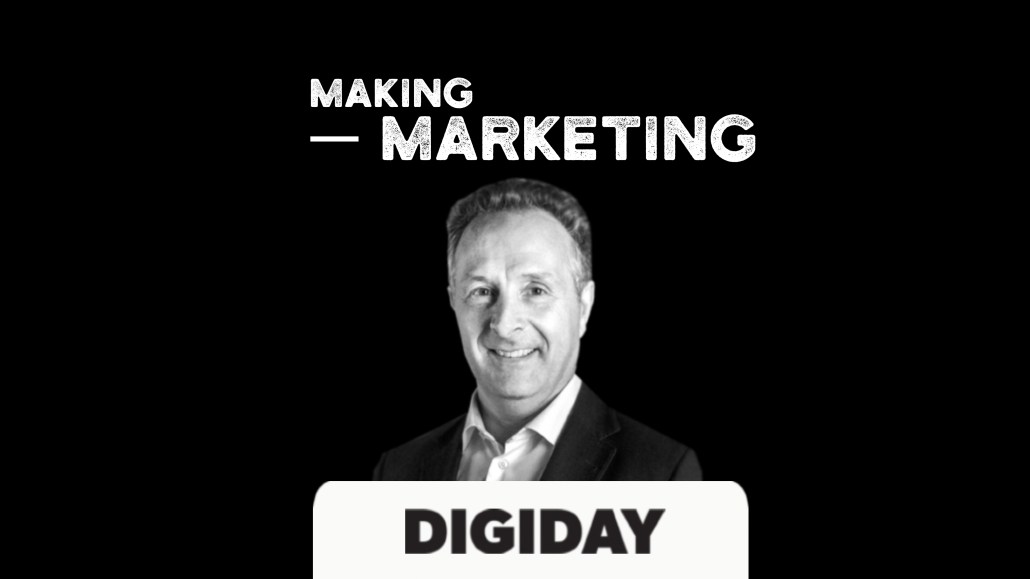Connect with execs from The New York Times, TIME, Dotdash Meredith and many more
Dentsu’s Nick Brien: Performance-based compensation deals are the future

To paraphrase industry veteran Rishad Tobaccowala, agencies are like cockroaches — they never die. Nick Brien, CEO of the Dentsu Aegis Network, certainly thinks so: The former Interpublic group executive is bullish on the agency business. But it does have its challenges. Brien talks about holding the agencies to a higher standard on accountability, the impending consultancy competition and procurement.
Subscribe: iTunes | Google Play | Stitcher | RSS | Anchor
Advertising’s role was customer acquisition and building awareness. It had no interest in churn, customer retention, customer loyalty and turning it into advocacy. We’ve come so far from that. What’s been hard for agencies is the complexities in all those areas. Data centricity and being able to pull that together and create analytics and insights out of that has gotten harder to do. CMOs are no longer experts in search, linking user experience to commerce and others. They have to be smart and generalist enough whilst having a holistic view of the business. So the agency world is fragmented into many specialist elements. Our industry isn’t really serving those together. A lot of it is also about the lack of accountability for our sector as a professional services industry to be able to demonstrate the advocacy and be paid accordingly. Now we’re in a battle for talent for people who can contribute on a specialist level and tie it together at a generalist level.
It’s going to get harder to acquire customers. It’s a huge opportunity for agencies that are not just selling services but the ones that design and create solutions. A lot of people talk about digital disruption and transformation but the biggest competitive advantage brands will have today is integration. The more integrated the advertising experience is for consumers, the more cost and time effective it will be.
The agency world needs to lean more into the world of performance, whether the value of creativity, impact of strategy and flawlessness of execution means we’re demonstrating real business results. There’s no reason why the economics of our model and our compensation deals cannot be structured to those kind of outputs. Negotiate with procurement, that tend to be pragmatic. Marketers are looking to drive innovation and growth. If it’s just a cost play and beating the crap out of agencies to get the lowest possible price, you know what the service outcome is going to be. Performance based compensation deals with become much more prevalent in the future.
The agency sector has not done its best when it comes to professional standards around accountability, transparency, simplicity and cost efficiency. The dynamic is changing, not withstanding, the fact that it gives us the responsibility and opportunity to define a value proposition and be paid accordingly.
The world of management consultants has not attracted the most creative and innovative people. They are trying and making acquisitions. What they are doing is bringing a level of rigor around technology, platforms and data centricity to bring marketing closer to business enterprises. We should be doing that too. But their lens of creativity is very different. The power of an idea to break through in an attention-starved world, where so many readers are moving behind paywalls, is a big issue in our industry. It’s an existential threat. The rich kids can afford ad free but others can’t. Management consultants are not the biggest disrupters, platforms are.
More in Marketing

WTF is ‘Google Zero’?
The era of “Google Zero” — industry shorthand for a world where Google keeps users inside its own walls — is here.

The next browser wars are here — and AI wants the ad dollars too
Perplexity and OpenAI are getting ready to take on Google’s Chrome, but will need a solid ad business to keep their browsers ticking along.

Vista Equity Partners’ TripleLift implements ‘significant’ layoffs
The latest round of layoffs is understood to have impacted all departments at the SSP across multiple geographies.





